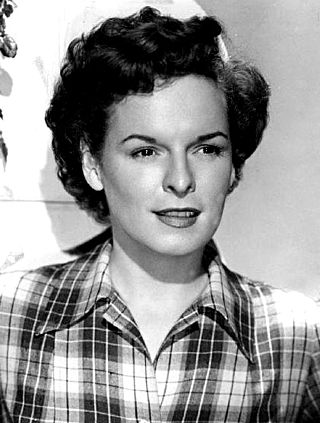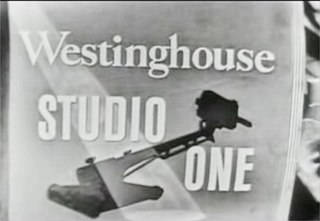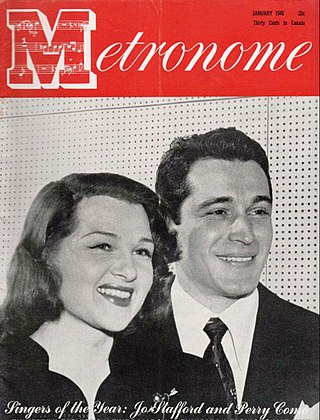Related Research Articles

The Pied Pipers were an American popular singing group originally formed in the late 1930s. They had several chart hits throughout the 1940s, both under their own name and in association with Tommy Dorsey, with Johnny Mercer and with Frank Sinatra.

Carlotta Mercedes Agnes McCambridge was an American actress of radio, stage, film, and television. Orson Welles called her "the world's greatest living radio actress". She won an Academy Award for Best Supporting Actress for her screen debut in All the King's Men (1949) and was nominated in the same category for Giant (1956). She voiced the majority of dialogue for demon Pazuzu in The Exorcist (1973).

Martin Block was an American disc jockey. It is said that Walter Winchell invented the term "disc jockey" as a means of describing Block's radio work.

Studio One is an American anthology drama television series that was adapted from a radio series. It was created in 1947 by Canadian director Fletcher Markle, who came to CBS from the CBC. It premiered on November 7, 1948, and ended on September 29, 1958, with a total of 467 episodes over the course of 10 seasons.

Fletcher Markle was a Canadian actor, screenwriter, television producer and director. Markle began a radio career in Canada, then worked in radio, film and television in the United States.
Peggy Allenby was an American stage, film, television, and radio actress.

The Chesterfield Supper Club is an NBC Radio musical variety program (1944–1950), which was also telecast by NBC Television (1948–1950).

Ford Theatre, spelled Ford Theater for the original radio version and known, in full, as The Ford Television Theatre for the TV version, is a radio and television anthology series broadcast in the United States in the 1940s and 1950s. At various times the television series appeared on all three major television networks, while the radio version was broadcast on two separate networks and on two separate coasts. Ford Theatre was named for its sponsor, the Ford Motor Company, which had an earlier success with its concert music series, The Ford Sunday Evening Hour (1934–42).

Ben Gage was an American radio singer and announcer, occasional off-screen film singer dubbing the voice of non-singing actors, and television actor active from 1937 to 1975. Born in Chicago, Illinois, his first wife was Esther Williams.

Elliott Lewis was an American actor, writer, producer, and director who worked in radio and television during the 20th century. He was known for his ability to work in these capacities across all genres during the golden age of radio, which earned him the nickname "Mr. Radio". Later in life, he wrote a series of detective novels.

The Frank Sinatra Show was a title applied—in some cases specifically and in other cases generically—to several radio musical programs in the United States, some of which had other distinct titles as indicated below. Singer Frank Sinatra starred in the programs, some of which were broadcast on CBS, while others were on NBC.

Marcia Evelyn Van Dyke was an American violinist and actress.

Kay Kyser's Kollege of Musical Knowledge is an American old-time radio musical quiz program starring Kay Kyser. It was broadcast on Mutual, NBC, and ABC beginning on February 1, 1938, and ending on July 29, 1949.
Hollywood Showcase is the title of two American old-time radio talent shows, both of which were broadcast on CBS in the 1930s and 1940s. During some intervals, the program was carried only on CBS's west-coast stations.
Let's Talk Hollywood is a radio quiz and panel discussion program that was broadcast on NBC from July 4 to September 26, 1948, as a summer replacement for The Jack Benny Program.
Hit the Jackpot is an American radio quiz program that was broadcast on CBS from May 9, 1948, through December 27, 1949, and from May 28, 1950, through September 3, 1950. It was originally titled Try 'n' Stop Me and then called Catch Me If You Can before Hit the Jackpot took effect on June 13, 1948.
An Evening with Romberg is an American musical radio program that was broadcast on NBC from June 12, 1945, until August 31, 1948, as a summer replacement for other programs. Sigmund Romberg was the star, and Raleigh cigarettes was the sponsor.
We Take Your Word is an American radio program that was broadcast on CBS beginning January 29, 1950. It was also adapted into a television version.
The Zane Grey Show is an American Western radio drama that was broadcast September 23, 1947 - February 24, 1948, on the Mutual Broadcasting System
Ford Theater is an American dramatic anthology radio program that was broadcast on NBC October 5, 1947 - June 27, 1948, and on CBS October 8, 1948 - July 1, 1949. The name was sometimes written as Ford Theatre.
References
- 1 2 3 4 Dunning, John (1998). On the Air: The Encyclopedia of Old-Time Radio (Revised ed.). New York, NY: Oxford University Press. p. 646. ISBN 978-0-19-507678-3 . Retrieved November 29, 2024.
- 1 2 McHatton, Martha (April 13, 1948). "Indianapolis on the Air" . The Indianapolis News. p. 23. Retrieved September 18, 2024– via Newspapers.com.
- 1 2 McHatton, Martha (March 30, 1948). "Indianapolis on the Air" . The Indianapolis News. p. 21. Retrieved September 18, 2024– via Newspapers.com.
- 1 2 Yount, Jeanne (December 30, 1947). "Brown KALE Manager" . Oregon Journal. Oregon, Portland. p. 17. Retrieved September 18, 2024– via Newspapers.com.
- 1 2 Yount, Jeanne (June 15, 1948). "Second Guess Proves Best" . Oregon Journal. Oregon, Portland. p. 27. Retrieved September 18, 2024– via Newspapers.com.
- ↑ "100-Year Old Story". Variety. August 6, 1947. p. 20. Retrieved September 18, 2024.
- 1 2 3 4 Butterfield, C. E. (May 16, 1947). "'Studio One' Still In Format Stage" . Cumberland Evening Times. p. 21. Retrieved September 16, 2024– via Newspapers.com.
- 1 2 3 4 5 Crosby, John (May 13, 1947). "Fanfare probably overdone in new dramas; need editing" . Daily News. California, Los Angeles. p. 27. Retrieved September 15, 2024– via Newspapers.com.
- 1 2 3 4 Stephan, Robert S. (May 1, 1947). "C. B. S. 'Studio One' Series Sets High Dramatic Standard" . The Plain Dealer. Ohio, Cleveland. p. 14. Retrieved September 15, 2024– via Newspapers.com.
- 1 2 "Markle to Play Lead On 'Studio One' On CBS Tuesday Night" . The Shreveport Times. July 20, 1947. p. A 13. Retrieved September 15, 2024– via Newspapers.com.
- ↑ "CBS 'Studio One' To Get Build-Up With Hiked Nut". Billboard. October 25, 1947. p. 6. Retrieved September 17, 2024.
- ↑ "CBS Spending Up to $2,000 For Film Stars on Sustaining Hour 'Studio One' Opposite McGee-Hope". Variety. October 22, 1947. p. 29. Retrieved September 18, 2024.
- 1 2 3 4 Gould, Jack (May 18, 1947). "Programs in Review: CBS Offers 'Studio One' -- A.F. of L. in Radio" . The New York Times. p. X 9. Retrieved September 17, 2024.
- 1 2 "The News of Radio: ' Christopher Wells' and 'Studio One' Moved to Tuesday Night Spots on CBS Chain" . The New York Times. January 20, 1948. p. 46. Retrieved September 17, 2024.
- 1 2 "CBS Gets 'Ford Theater'; Dempens Hopes on 'Studio One'". Billboard. July 3, 1948. p. 9. Retrieved September 17, 2024.
- ↑ "Studio One". The Peabody Awards. Archived from the original on August 11, 2016. Retrieved September 17, 2024.
- ↑ "'Studio One'". Variety. July 7, 1948. p. 29. Retrieved September 18, 2024.
- ↑ "Markle". Variety. July 14, 1948. p. 48. Retrieved September 18, 2024.
- ↑ "CBS To Revive 'Studio One' in Video Version". Billboard. October 30, 1948. p. 14. Retrieved September 17, 2024.
- ↑ Chase, Sam (May 10, 1947). "Studio One". Billboard. pp. 11, 17. Retrieved September 17, 2024.
- ↑ Young, Jeanne (August 5, 1947). "What's on the Air" . Oregon Journal. Oregon, Portland. p. 23. Retrieved September 15, 2024– via Newspapers.com.
- ↑ Yount, Jeanne (November 4, 1947). "Noble's News Is Different" . Oregon Journal. Oregon, Portland. p. 23. Retrieved September 16, 2024– via Newspapers.com.
- ↑ McHatton, Martha (January 27, 1948). "Indianapolis on the Air" . The Indianapolis News. p. 21. Retrieved September 18, 2024– via Newspapers.com.
- ↑ "Susan Peters on 'Studio One,' 10" . Atlantic City Press. March 16, 1948. p. 14. Retrieved September 18, 2024– via Newspapers.com.
- ↑ McHatton, Martha (May 4, 1948). "Indianapolis on the Air" . The Indianapolis News. p. 24. Retrieved September 18, 2024– via Newspapers.com.
- ↑ "Elizabeth Saluted" . Oregon Journal. Oregon, Portland. June 29, 1948. p. 23. Retrieved September 18, 2024– via Newspapers.com.
- 1 2 Adams, Magee (May 6, 1947). "New Show Cinch As 'Pinch Hitter' With 'Studio One'" . The Cincinnati Enquirer. p. 12. Retrieved September 16, 2024– via Newspapers.com.
- 1 2 "Studio One". Variety. May 7, 1947. p. 52. Retrieved September 18, 2024.